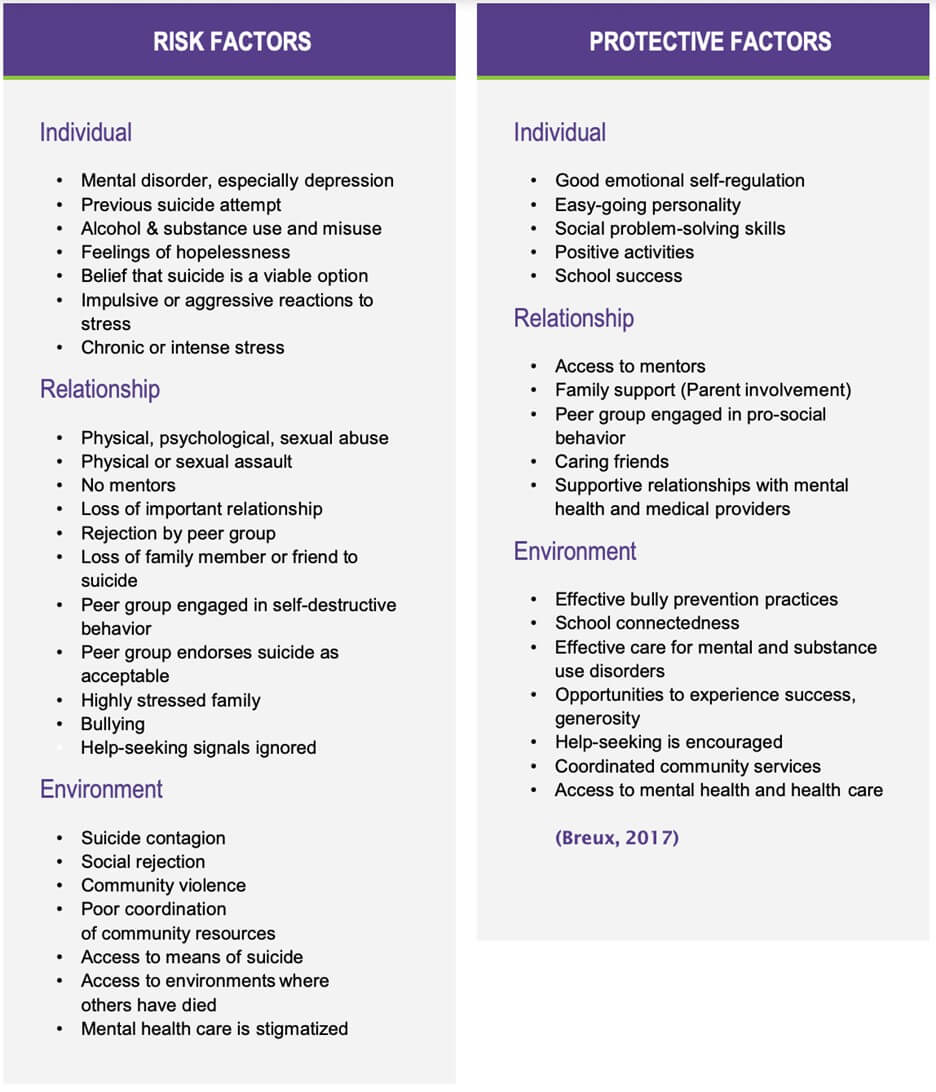A nurse is providing a community health education class about suicide prevention. Which of the following should the nurse identify as risk factors for suicide? (Select all that apply).
Female gender
Currently married
Age greater than 45 years old
Substance use disorder
Schizophrenia: Correct
Correct Answer : C,D,E
A. Female gender: Incorrect
While the risk of attempted suicide is generally higher in females, completed suicide rates are higher in males. Therefore, being female is not typically considered a primary risk factor for suicide, though it's important to note that both genders require attention for prevention.
B. Currently married: Incorrect
Being married is generally considered a protective factor against suicide. Social support and close relationships tend to reduce the risk of suicidal behavior.
C. Age greater than 45 years old: correct
Suicide risk tends to increase with age, particularly for men. Individuals over 45, especially those facing chronic illness, social isolation, or significant life changes, are at higher risk.
D. Substance use disorder: Correct
Substance use disorder is a significant risk factor for suicide. Substance abuse can contribute to feelings of hopelessness and despair, impair judgment, and lower inhibitions, increasing the likelihood of suicidal behavior.
E. Schizophrenia: Correct
Schizophrenia is a mental disorder associated with an increased risk of suicide. The symptoms of schizophrenia, such as hallucinations, delusions, and feelings of isolation, can contribute to severe distress and increase the risk of suicidal ideation and behaviors.

Nursing Test Bank
Naxlex Comprehensive Predictor Exams
Related Questions
Correct Answer is C
Explanation
A) "I haven't gotten my period yet, and all my friends have theirs."
While the concern about not having gotten her period yet is a valid one, it's a common experience during adolescence. Variability in the timing of puberty is normal, and addressing this concern might involve providing reassurance and education about the natural range of development.
B) "There's a big pimple on my face, and I worry that everyone will notice it."
While concerns about physical appearance are common during adolescence, they are less urgent in terms of emotional and psychological well-being. Addressing body image issues is important, but the statement about lack of social acceptance and reciprocal liking indicates potentially deeper emotional challenges.
C) "None of the kids at this school like me, and I don't like them either."
Explanation:
Adolescence is a time of significant emotional and social development. The statement about not being liked by other students and not liking them in return indicates potential social isolation and difficulties in forming positive relationships. Adolescents often seek social acceptance and peer relationships are crucial for their well-being and development.
D) "My parents treat me like a baby sometimes."
This statement suggests a common parent-adolescent dynamic where there might be conflicts about independence and autonomy. While these feelings are valid, they don't necessarily reflect a higher priority concern related to social isolation and peer relationships.
Correct Answer is C
Explanation
A. "I think you should calm down a little before you see your partner.":
Explanation: This response might come across as dismissive or insensitive to the partner's feelings. It's important to acknowledge the partner's emotions and offer support rather than suggesting they should calm down.
B. "Do not worry about that. Your wife will be fine.":
Explanation: While it's reassuring to say that the patient will be fine, dismissing the partner's feelings and concerns is not supportive. The partner needs a chance to express their emotions and concerns.
C. "Tell me more about your feelings about what happened to your partner.":
Explanation: Correct Answer. This response is empathetic and encourages the partner to express their emotions. It shows that the nurse is actively listening and is willing to provide a safe space for the partner to share their feelings.
D. "Why do you think the crash is your fault?":
Explanation: This response might come across as accusatory or confrontational, which could exacerbate the partner's feelings of guilt. Instead, the nurse should focus on providing support and understanding.
Whether you are a student looking to ace your exams or a practicing nurse seeking to enhance your expertise , our nursing education contents will empower you with the confidence and competence to make a difference in the lives of patients and become a respected leader in the healthcare field.
Visit Naxlex, invest in your future and unlock endless possibilities with our unparalleled nursing education contents today
Report Wrong Answer on the Current Question
Do you disagree with the answer? If yes, what is your expected answer? Explain.
Kindly be descriptive with the issue you are facing.
